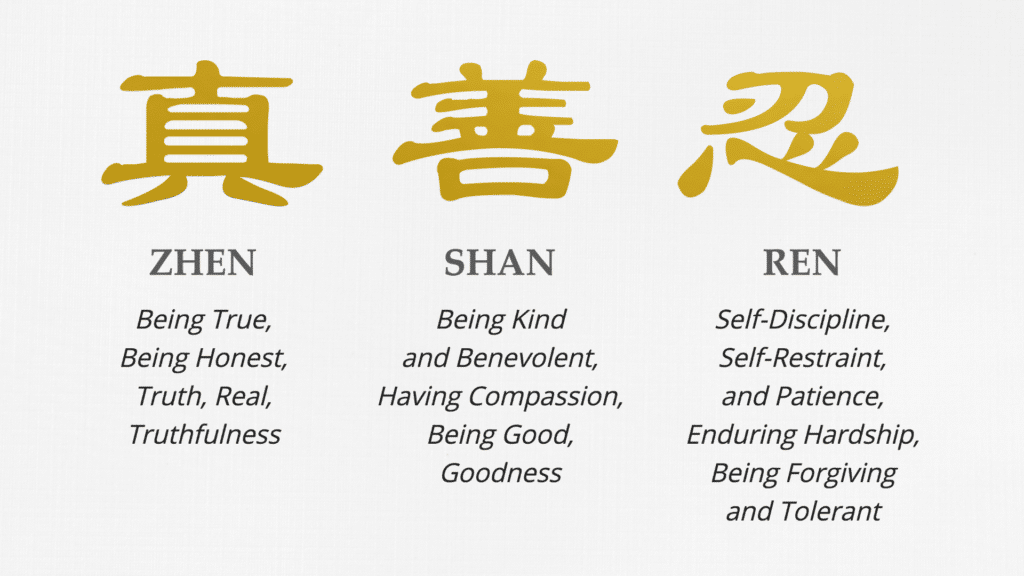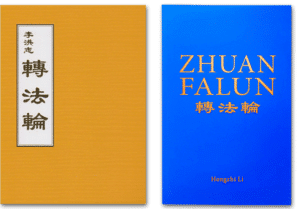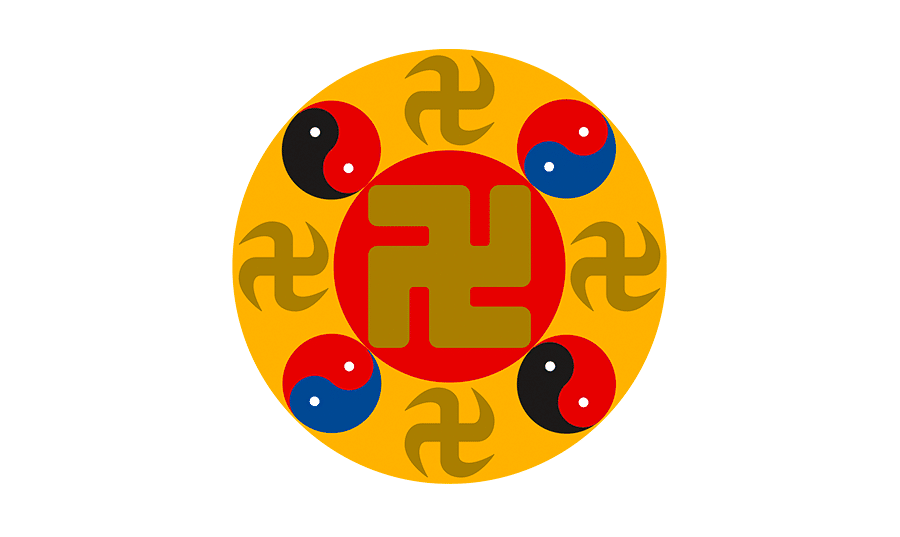
What is Falun Gong?
Falun Gong (also called Falun Dafa) is an ancient spiritual practice in the Buddhist tradition.
Falun Gong combines meditation and gentle exercises (similar to yoga or tai chi) with a moral philosophy centered on the tenets of Truthfulness, Compassion, and Tolerance (or in Chinese, Zhen 真, Shan 善, Ren 忍). Falun Gong practitioners aspire to live by these principles in their daily lives.
In traditional Chinese culture, the process of perfecting and refining mind and body is called “cultivation”. Our modern language uses the word qigong to describe it.
What differentiates Falun Gong from other forms of qigong, is its emphasis on one’s morality and the cultivation of virtue.

The History of Falun Gong
Falun Gong represents a direct and authentic connection to genuine traditional Chinese culture.
The ancients believed that through disciplined spiritual practice a human being is capable of transcending ordinary existence. They sought a higher state of being, free of suffering and the illusions of the mundane world. Attaining such state required moral rectitude, letting go of earthly desires, and the use of meditation practices to improve mind and body. Numerous disciplines arose, offering paths for spiritual growth. Many were quietly passed down over the ages from masters to disciples…
Falun Gong arises out of this lineage and is adopted for a modern lifestyle. The practice was introduced to the public in May of 1992 by Mr. Li Hongzhi.
The health benefits reported by people taking up Falun Gong are often immediate and many times dramatic, with some patients even recovering from severe illnesses. In addition, the Chinese people recognized in Falun Gong an authentic representation of the spiritual traditions which have almost been lost after decades of communist rule. This sparked a wave of excitement about the practice in China during the 1990s, and the practice grew rapidly across the country.
By 1998, just six years after its first introduction to the public, official Chinese records estimated 70-100 million had taken up the practice, making Falun Gong the fastest growing, and most popular form of qigong in Chinese history.
However, upon gaining deeper understanding of the practice, it became apparent to practitioners that Falun Gong was not just another qigong practice to improve health and wellness. Instead, the practice represented a rediscovery of the “old, good things of ancient China,” as one grandfather and former Chinese official put it. The virtues of Falun Gong’s teachings rekindled the values of China’s traditional past; the strength and honesty of Taoism, the compassion and goodness from Buddhism, and the wisdom to deal with people and social settings with righteousness and tolerance from Confucianism.
In Falun Gong people experienced a renaissance of traditional Chinese wisdom and values, and this resonated deeply with people all across China.
Falun Gong Teachings and Beliefs

At the core of Falun Gong’s teachings are the values of Truthfulness, Compassion, and Forbearance.
Ancient Chinese schools of thought emphasized that seeking ‘harmony between heaven, nature and men’ can bring stability and prosperity to society. Similarly, for a person on a spiritual path, aligning with the guiding principles of the universe (the Tao, or the Way), and assimilating to its qualities, can bring greater mental and physical health, blessings and different levels of spiritual awakening.
Falun Gong teaches that the most fundamental characteristic of the universe can be summarized in just three words: Zhen, Shen, Ren — translated as being true, kind, and forbearing.
These three principles serve as a guide for Falun Gong practitioners in their daily life. That is, each day they work to cultivate these principles in their own character, becoming more true, kind, and forbearing people.

Falun Gong Books
Falun Gong teachings are set forth in a number of texts, with the two main books being Falun Gong and Zhuan Falun.
Zhuan Falun, is the focal book and contains the complete teachings of the Falun Dafa practice. It is compilation of lectures given by Mr. Li in China between 1992-1994. In 1996, the book became a national bestseller in China.

Zhuan Falun has redefined the term qigong and cultivation practice for Chinese people, and while discussing very profound principles, its simple and accessible language allowed millions to embark on their own path of self-betterment. It expounds upon profound principles including the long-forgotten term “cultivation”, the origins of illnesses, karma, the role of moral character on a path to spiritual perfection, etc.
Falun Gong books have been now translated into over 40 languages, and are published and distributed worldwide. All instructional materials including books and videos are available free of charge at FalunDafa.org. Published Dafa books can be bought at FaYuanBooks.com or TiantiBooks.org.
What does it mean to practice Falun Gong?
Practicing Falun Gong is a process of ennobling one’s heart and mind with truthfulness, compassion and forbearance, and letting go of unhealthy habits and pursuits. When encountering hardships or conflicts, Falun Gong teaches to endure and not to fight back or blame others, but rather to search within oneself for one’s short-coming or cause, and improve oneself in the process.
Other forms of qigong talk about different levels of achievement. In Falun Gong, a person’s progress is tied strictly to improvement of one’s character.
The process of self-cultivation, supplemented with a set of energy exercises and meditation, can lead to improved health, inner peace, increased wisdom, and, in advance stages, to various levels of spiritual awakening (or enlightenment).
Falun Gong teachings consider one’s original nature as being good, and thus cultivation is sometimes referred to as returning to one’s original, true, good self.
The Five Exercises of Falun Gong
Qigong is a science of the human body that is not commonly explored or well understood in the West yet. Many practices of the East, on the other hand, including Chinese medicine, have acknowledged and studied life-energy, and its circulation through energy channels of the body for thousands of years. Understanding of the energy channels and how they can be unblocked, opened, and widened for health benefits, is the foundation of traditional healing systems of the East.
Similarly, qigong practices teach how to work with the life-energy of the body, how to improve its circulation inside the body, and at advanced levels, it even talks about transforming the life-energy of the body into more potent energy, called gong.
Qigong exercises are often very slow-moving, sometimes even completely motionless. The practice of Falun Gong offers four standing exercises that include stretching movements, holding still positions, and slow movements that lead the energy through the body. It also includes sitting meditation.

Falun Gong’s Health Benefits
Several health studies (conducted in China, the United States, Russia, & Australia), including clinically controlled, peer-reviewed research at leading medical facilities, have begun to explore and confirm the positive, and sometimes dramatic, health benefits that so many persons attribute to the practice.
Typical benefits that people describe include increased amounts of energy and reduced fatigue; greater resistance to disease; better sleep; emotional balance; a sense of calm; a positive outlook; improved relationships; greater self-awareness; a deeper sense of meaning; and spiritual growth.
Awards and Recognitions from Around the World
Falun Gong has been the subject of many citations, awards, and proclamations, conferred by government officials and a variety of organizations. Many who practice Falun Gong have been the recipients of service awards in their communities and at their workplaces.
The practice’s founder, Mr. Li Hongzhi, is a four-time Nobel Peace Prize nominee and was nominated by the European Parliament for the Sakharov Prize For Freedom of Thought. He is also the recipient of Freedom House’s International Religious Freedom Award.
Awards from China and Around the World
10 PHOTOS
Few people today are aware that Falun Gong and its practitioners received much in the way of official recognition in China during the 1990s, prior to a dramatic and violent change in political winds in 1999, which saw the practice persecuted. Mr. Li gave over 50 lecture series around China upon invitation from local governments and associations, (as well as Chinese embassies overseas).
In 1993, The People’s Public Security News—the official newspaper of China’s Ministry of Public Security—praised Mr. Li for his contributions “in promoting the traditional crime-fighting virtues of the Chinese people, in safeguarding social order and security, and in promoting rectitude in society.”
By 1999, Chinese officials went so far as to quantify Falun Gong’s benefits, such as when one official from China’s National Sports Commission, speaking with U.S. News & World Report, declared that Falun Dafa “can save each person 1,000 yuan in annual medical fees. If 100 million people are practicing it, that’s 100 billion yuan saved per year in medical fees.” The same official went on to note that, “Premier Zhu Rongji [equivalent to the office of Vice President in the U.S. executive branch] is very happy about that.”
Falun Gong Around the World
Today, people practice Falun Gong in over 100 countries around the world.
How to learn Falun Gong?
Visit FalunDafa.org — at this website, you can view instructional videos to learn the exercises or download the Falun Gong books, all for free. Many find it beneficial to learn from volunteers at a local park. Falun Gong practice sites are available in most cities around the world. You can use this website to find a practice site near you.
Visit LearnFalunDafa.org — if you prefer to have instruction online, you can signup for free online classes available on this website.
Falun Gong FAQ
What are Falun Gong’s teachings and beliefs?
At the core of Falun Gong are the values of Truthfulness, Compassion, and Tolerance (or in Chinese, Zhen 真, Shan 善, and Ren 忍). Falun Dafa teaches that these are the most fundamental qualities of the universe. Practitioners strive to adopt these principles into their daily life through meditation, Tai-chi-like exercises, and the study of Buddhist-based moral principles.
Is Falun Gong a religion?
To practice Falun Gong, there is no organization to join, no membership, no hierarchy, and no fees. Anyone who would like to practice may do so without spending a penny, in the privacy of one’s own home, and without requiring the help or approval of anyone else.
The practice does have spiritual teachings and a set of beliefs similar to what one would find in a religion, and it does share some of the same aspirations as groups more formally identified as religions, including the ennoblement of one’s moral self or the pursuit of spiritual awakening.
Under the law of most Western countries, Falun Gong is considered a religion or a protected creed. However, Falun Gong is not institutionalized; it does not have any formal means of initiation, a formal creed, nor devotional practices of worship, etc.
Falun Gong is not political, nor is it a business. All instructional materials are available on the Internet, free of charge, and volunteers provide all classes free of charge as well.
Falun—The Symbol of Falun Dafa

The emblem of Falun Dafa is called the “Falun,” a Chinese term that translates loosely as “Wheel of Law.” It is composed of two primary elements: yin-yang symbols, which are Taoist in nature, and srivatsa, which are Buddhist. The srivasta, or swastika as it is known in English, is commonly seen in Asian Buddhism.
In Asian culture, the negative connotations of the swastika attributed to Hitler and the Nazis are relatively unknown. In fact, the swastika has a history going back thousands of years in many cultures and is widely considered a symbol of good fortune.
Who practices Falun Gong?
Although Falun Gong was first made public in China in 1992 and became widely popular there, the practice has also been adopted by people around the world. Today, Falun Gong is practiced in over 80 countries across the globe. Falun Gong books have been translated into 40 languages.
How many people practice Falun Gong?
By early 1999, Chinese government officials and state-run media said there were 70-100 million people practicing Falun Gong in China, making it the fastest growing religion in the world at that time. Although the Chinese Communist Party launched a persecution campaign to “stamp out” Falun Gong, human rights organizations estimate that tens of millions continue to practice throughout China. Falun Gong practitioners are also found in over 100 countries around the world, but because there is no membership, it is difficult to give precise numbers.
Who started Falun Gong?
Falun Gong was first made public by Mr. Li Hongzhi. A native of Changchun, China and now living in the U.S., Mr. Li is a five-time Nobel Peace Prize nominee and was nominated by the European Parliament for the Sakharov Prize For Freedom of Thought. He is also the recipient of Freedom House’s International Religious Freedom Award.
Why is Falun Gong banned in China?
Although widely popular and openly celebrated by the Chinese government throughout the 1990s, a few top leaders of the Chinese Communist Party launched a violent campaign against Falun Gong in 1999. They did so due to Falun Gong’s exploding popularity and because they felt Falun Gong’s emphasis on moral living and traditional Chinese culture were a threat to the atheist communist regime that largely ruled by fear. Many insiders also point out that China’s top leader at the time, Jiang Zemin, personally resented Falun Gong’s popularity, fearing it was stealing attention away from his efforts to build a lasting legacy for himself.
What’s the difference between Falun Gong and Falun Dafa?
“Falun Gong” is simply another name for “Falun Dafa.” They refer to the same thing — the Buddhist-based spiritual practice originating in China. “Falun Dafa” is the formal name of the practice, whereas “Falun Gong” is a more colloquial term made popular in China.































































